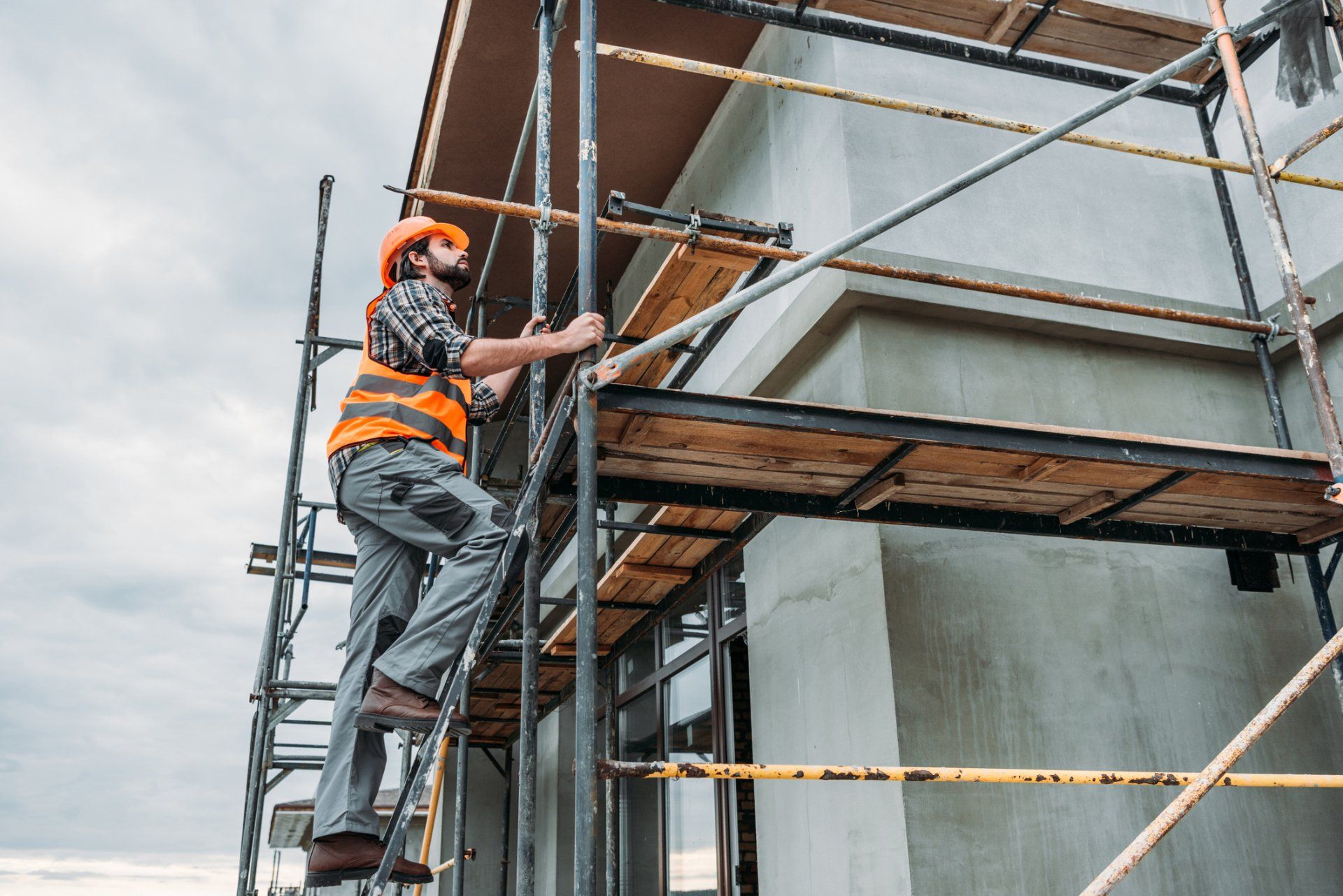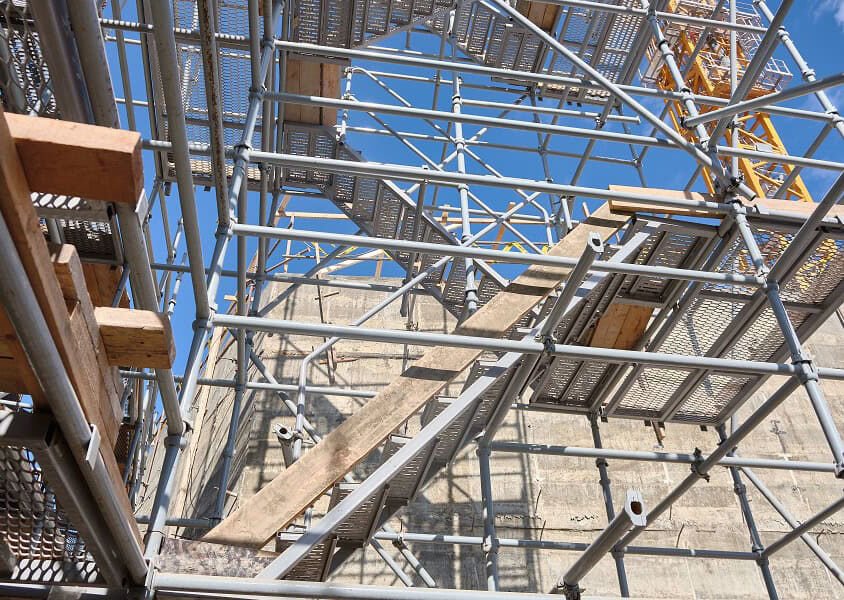Top-Notch Scaffolding Near Me: Expert Solutions for Every Job
Top-Notch Scaffolding Near Me: Expert Solutions for Every Job
Blog Article
Checking Out the Different Sorts Of Scaffolding Utilized in Building And Construction Projects
The building sector relies heavily on various types of scaffolding to satisfy specific project demands, each offering distinctive benefits and applications. Traditional frame scaffolding gives a tough structure for basic tasks, while suspended scaffolding is vital for work on high-rise frameworks.

Standard Structure Scaffolding
Conventional structure scaffolding is one of the most widely made use of approaches in the construction sector due to its toughness and adaptability. This system contains horizontal and upright structures that are assembled to develop a steady platform for products and workers. The primary elements include vertical articles, horizontal ledgers, and diagonal braces, which together supply a strong framework that can support significant loads.
One of the key advantages of conventional structure scaffolding is its adaptability to various building and construction tasks, ranging from domestic structures to huge industrial structures. The modular layout enables easy assembly and disassembly, making it reliable for both short-term and lasting projects. Additionally, the system can be customized in height and size, fitting different building designs and site problems.
Safety and security is critical in scaffolding applications, and typical structure systems are geared up with guardrails and toe boards to avoid falls and ensure worker defense. In addition, routine assessments and adherence to safety policies are vital in keeping the honesty of the scaffold. On the whole, conventional structure scaffolding stays an essential selection in the building and construction industry, giving a reliable platform for labor and boosting general project performance

Suspended Scaffolding
Put on hold scaffolding uses an unique service for construction tasks that call for access to raised surface areas, particularly in circumstances where traditional framework scaffolding may be not practical. This kind of scaffolding is normally suspended from the roofing system or top levels of a framework, utilizing a system of wheels, ropes, and systems to produce a working area that can be adapted to numerous heights.
One of the key advantages of put on hold scaffolding is its versatility. It can be conveniently repositioned or lowered to accommodate modifications in building and construction needs, making it ideal for jobs such as window setup, façade job, and upkeep on high-rise buildings. In addition, the very little impact of suspended scaffolding enables for much better use ground area in urban environments, where area is often minimal.
Safety and security is a crucial factor to consider in the usage of put on hold scaffolding. On the whole, put on hold scaffolding provides a effective and reliable remedy for accessing hard-to-reach areas in different construction situations, enhancing both performance and security on site.
System Scaffolding
System scaffolding, commonly related to as a modern service in the scaffolding market, includes pre-engineered parts that can be promptly assembled and adapted for various construction projects. Scaffolding. This type of scaffolding is characterized by its modular design, which allows for adaptability and performance on work sites, accommodating different heights and architectural needs
Normally made from high-strength steel or light weight aluminum, system scaffolding supplies enhanced sturdiness and security. The parts view it now include upright articles, horizontal journals, and angled braces, which adjoin firmly, guaranteeing a durable framework. The style commonly integrates standard fittings, streamlining assembly and disassembly procedures, thereby lowering labor time and expenses.

Rolling Scaffolding
Rolling scaffolding is a flexible option to standard fixed scaffolding, designed for movement and Your Domain Name convenience of usage on building sites. This kind of scaffolding includes a system sustained by structures with wheels, permitting workers to conveniently move it as required. The flexibility feature substantially enhances efficiency, as it minimizes downtime related to taking apart and assembling fixed scaffolding.
Typically constructed from lightweight products such as aluminum or steel, rolling scaffolding uses a tough yet mobile remedy for projects needing regular repositioning - Scaffolding. It is particularly useful in jobs such as paint, drywall installation, and electrical job, where access to numerous elevations and locations is essential
Safety is vital in rolling scaffolding style, with functions such as securing wheels to avoid unintentional motion when in use, and guardrails to shield employees from falls. In addition, many designs are flexible in elevation, suiting numerous task demands.
Cantilever Scaffolding

The style of cantilever scaffolding usually entails using arms or braces anchored to a structure or framework, making it possible for the platform to expand outward securely. Security is critical; thus, these scaffolds have to be engineered to stand up to environmental conditions webpage and various lots. Regular assessment and upkeep are necessary to ensure architectural integrity and employee safety and security.
Cantilever scaffolding is preferred for its adaptability and efficient use of room, making it a popular choice in urban environments where area restraints are typical. It promotes simpler accessibility to high elevations, eventually contributing to the general performance of construction projects. Similar to all scaffolding kinds, correct training and adherence to safety and security requirements are vital for employees utilizing cantilever scaffolding.
Final Thought
Finally, the varied sorts of scaffolding used in building and construction projects each offer distinctive purposes customized to details website demands. Typical frame scaffolding supplies stability, while put on hold scaffolding supplies adaptability for elevated tasks. System scaffolding assists in fast setting up, and rolling scaffolding improves wheelchair for differing workplace. Cantilever scaffolding efficiently attends to challenges in urban settings. Recognizing these scaffolding types is necessary for enhancing safety and security and productivity in building and construction, inevitably adding to the successful completion of tasks.
Typical framework scaffolding supplies a durable foundation for basic jobs, while put on hold scaffolding is essential for work on high-rise structures.Moving scaffolding is a versatile option to traditional set scaffolding, designed for wheelchair and ease of usage on construction websites. As with all scaffolding types, correct training and adherence to safety requirements are vital for workers making use of cantilever scaffolding.
Conventional frame scaffolding provides security, while suspended scaffolding uses adaptability for elevated jobs. System scaffolding facilitates fast setting up, and rolling scaffolding enhances flexibility for differing job environments.
Report this page